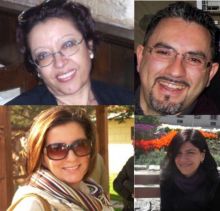
 How communities can react to crisis: Social capital as a source of empowerment and well-being
How communities can react to crisis: Social capital as a source of empowerment and well-beingCarmencita Serino, Daniele Morciano, Anna Fausta Scardigno, & Amelia Manuti
Peer Reviewed
This paper provides an accounting for a repertoire of “good practices” experienced in the south of Italy, which have been read with theoretical and methodological lenses borrowed from social community psychology as well as sociology. The discussion provides two case studies (Diffused Guest House and Urban Laboratories) which are both representative in terms of social participation as well as in terms of social capital enhancement.
Leer más... No Place Like Home: Examining a Bilingual-Bicultural, Self-Run Substance Abuse Recovery Home for Latinos
No Place Like Home: Examining a Bilingual-Bicultural, Self-Run Substance Abuse Recovery Home for LatinosR. Contreras, J. Alvarez, J. DiGangi, LA Jason, L. Sklansky, I. Mileviciute, E. Navarro, D. Gomez, S. Rodriguez, R. Luna, R. Lopez, S. Rivera, G. Padilla, R. Albert, S. Salamanca, & F. Ponziano
Peer Reviewed
Latinos often do not seek substance abuse services, and this might be correlated to the lack of culturally-modified substance abuse treatment approaches. Oxford House is the largest self-help residential recovery program in the U.S., yet few Latinos are among their current residents. In an effort to change this, bilingual-bicultural recovery homes were recently developed for Latinos. This article describes the process in opening these bilingual-bicultural houses and how sociocultural factors such as the family, simpatía, and gender roles impacted the living environment of these houses.
Leer más... Is Participatory Research Compatible with Graduate Research? Reflections From Three Stakeholders
Is Participatory Research Compatible with Graduate Research? Reflections From Three StakeholdersLisa Armstrong, Colleen Loomis, & Esperanza Mairena-Torres
Peer Reviewed
Graduate programs aim to train future researchers and practitioners in the values, skills and tools of their trade. This paper reports on the experiences of a graduate student, a youth co-researcher and a faculty supervisor while conducting thesis research within a community psychology master’s degree program.
Leer más... Community Leadership
Community LeadershipScotney D. Evans
Peer Reviewed
This paper draws on examples and stories to offer five basic assumptions for a humble model of community leadership. First, community leaders are agents of change. Second, community leaders are driven by a set of core ideals and principles of community action. Third, having or acquiring technical leadership skills or a formal position is not enough to make one an effective and transforming leader in communities. Fourth, leadership in communities is more complex and beyond the efforts of any one individual charismatic leader. Lastly, community leadership is praxis – action informed by practical wisdom and theory that is consciously reflected on in order to generate learning and new action.
Leer más...
Jose Ornelas, Teresa Duarte, & Ines Almas
This video describes the “Casas Primeiro” program. This program uses a housing first approach, providing permanent, independent and scattered housing, rented from community landlords in mainstream neighborhoods, to homeless people with severe mental illness in the city of Lisbon, Portugal.
ver el vídeoJames R Cook
By our very nature, Community Psychologists are collaborators and alliance-builders. This editorial discusses the possibility of building additional strategic alliances.
We are pleased to provide another wonderful issue of the Global Journal. In this issue, you will find several outstanding items of interest.
Jessica Collura and Shepherd Zeldin
Youth-adult partnership (Y-AP) is a powerful strategy of organizational improvement and community change. When youth and adults participate in collective decision-making and action, communities and organizations can ensure the needs of all stakeholders are met. In fact, research demonstrates that intergenerational partnerships benefit youth development and adult competency and confidence. Moreover, organizations and communities gain a greater capacity to respond, through policy and program, to the critical interests, concerns and priorities of young people.
by Niki Harré
Reviewed by Judah Viola
In this book, Harré culls literature from a variety of disciplines (e.g., social psychology, perception, community psychology, positive psychology, cross cultural psychology, learning and development etc…), making clear for the reader how recent developments in research and theory can be interpreted and applied to sustainability at the individual, group, and systems levels.